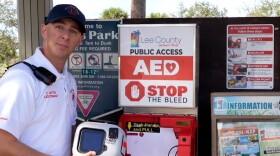Listen to the shortened radio version, or read the transcript below which has been edited for clarity.
Karen Moore, publisher of Southwest Florida Business Today:
Tauheedah, let's say your hurricane Ian E IDL application was turned down. What is the business owner's first level of recourse?
Taheeda Mateen, SBA Public Affairs Specialist with Small Business Administration Disaster Assistance Office:
First, I would like to mention that it's important that the SBA's initial decision does not have to be the final decision. If we are unable to offer a loan to those survivors, they will receive a letter of explanation of the reasons why the loan was not approved and also the steps to request a reconsideration of that decision. I always urge applicants do not throw that decision letter away.
The second step is to follow all of the instructions in the letter and return all of the items on the list when they have them together. So, we advise applicants to respond with the complete reconsideration request. For example, if there are three documents needed on that decision letter, applicants should respond with all three items to ensure a complete reconsideration. The reconsideration does take some time for the files to be reviewed and also they can also call the 1-800-659-2955 to speak with the customer service representative to discuss their file. But please follow all of those steps in the letter that that individual receives is mostly important with that EIDL decision letter.
Moore:
Every time you have to send documents in, you always have to send in a new transcript request from the IRS for your tax returns. Is that correct?
Mateen:
On occasion that does happen. We just make sure we want to make sure that everything is lined up and we can actually get those transmissions from the IRS. If there is something on that 4506-T that's not the same as what that applicant submitted to the IRS, that will kick back sometimes those. Those 4506 forms time out. So we will need to request another 4506-T form. Oftentimes, if the the case manager changes, we may ask for that form again. So there's different circumstances as into which we will request that form again.
Moore:
Now, let's say you applied for reconsideration. You had that first denial, you applied for reconsideration, you got everything turned in by the deadline you were given. Then your loan application was denied. Please share with us the main reasons an application would be denied.
Mateen:
Great question and we get this this question a lot. Unfortunately there are two common reasons why the SBA may not be able to offer a loan. One is unsatisfactory credit history. Second, for those disaster loans is not being able to repay the loan. It's in no one's interest to approve a loan that cannot be repaid. Applicants do have the opportunity to explain any unusual circumstances that may affect SBA's analysis of the credit history or the income. And we also advise applicants to submit documentation to support those explanations, as well.
I do want to mention that this is why long-term conversations are so important right now, and it's such a hot topic right now. We remain in the area. SBA, SBDC's Apex, which is formerly PTAC PtAX score. They're working extremely hard to help businesses in Florida with their long term emergency business plans, continuity planning, etc.
The way that SBA does their analysis of applications, most of those barriers can be fixed by working with those resource partners with SBA before, during, and after disasters which we remain in the area to help with.
Moore:
Do you have any specific examples that you have encountered with local business owners that you have guided through this process?
Mateen:
We continue to work with our SBDC because you know they are a permanent fixture in the area in Florida. So, at the Office of Disaster Recovery Resilience, we continue to refer business owners to the SBDC. We've referred applicants to them who assisted them in writing a business plan. One applicant submitted their business plan with current profit and loss statements to justify additional income and it was accepted. Their application is in the process. Another example that I have is a business owner who completed a bankruptcy due to an automobile accident and initially they were not offered a loan. But in the reconsideration, the applicant explained the circumstances that led to the bankruptcy and he was able to show that he reestablished a good credit history. We were able to approve the loan on reconsideration.
So, I would advise applicants and survivors to keep the line of communication open. Provide any documentation that supplements your explanation e-mail to the processing and disbursement center. You know, we can look at it this way: everyone gets 3 bites at an apple. And if the SBA is unable to approve the initial application, we give six months to act for reconsideration. If we're not able to offer a loan, then we'll give you 30 days to ask for an appeal, and then the deadlines that are are specific to each person in their letter that they receive.
Moore:
So, to be perfectly clear, may businesses still submit their applications for reconsideration at this point?
Mateen:
Right. In their decision letter it will have a date. You must submit reconsideration by those dates, which vary from applicant to applicant.
Moore:
Do you have any other specific examples that you have encountered in this process at this point?
Mateen:
You know the examples seem to be the same across the board. There are a lot of people in the area that were affected by Hurricane Ian that really continued to need help understanding the process. Also, the length of time that it may take for them to get their specific application completed.
We continue to process hurricane applications day-by-day. We continue to understand the wait that people are going through. We want to make sure that people are getting sufficient information. We continue to refer those survivors and those applicants to the SBDC (Small Business Development Council,) and all of our resource partners, to make sure that for the next disaster that may hit this area, they are well equipped, they have their business plan. The SBDC can help them with their financial documents, make sure that their profit and loss statements are filled out correctly.
Moore:
Is there anything else today that you would like to share with our audience?
Mateen:
Absolutely. For those applicants who are still going through the process, please keep the lines of communication open. The 1-800-659-2955 is available for applicants, to speak with representatives, to ask questions about their file. Also visit sba.gov to be familiar with preparedness tools and the disaster program in its entirety.
Locate and join the SBDC Trainings. Our disaster team are still on the ground and we are joining these trainings to make sure that we add that disaster piece in there. We're available to look up applications to find out what's going on with the files.
If you're still going through the reconsideration process, get involved with your local Chambers of Commerce and economic development agencies to locate local resources that may help your business grow throughout the disaster process. Now is the time to have these conversations. We are in hurricane season again and now is the time to have these business continuity conversations and disaster related conversations.
Karen Moore is a contributing partner for WGCU and the publisher of SWFL Business Today.








